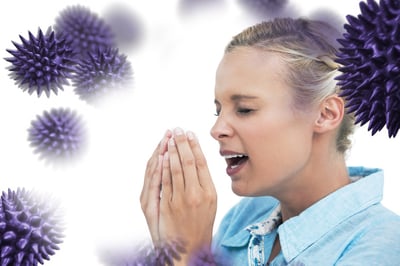It’s springtime! The flowers are blooming, grass is growing, and birds are chirping! But, if you’re a seasonal allergy sufferer, the misery of red, itchy eyes, continuous sneezing and post-nasal drip can dampen the excitement of the beauty that surrounds us. Pollen from trees, weeds, and grasses are the primary culprits behind seasonal allergies. An estimated 25 million Americans suffer from spring allergies from tree, grass, and weed pollen. Airborne pollen is the most common cause of seasonal allergies, also known as hay fever or allergic rhinitis. 
HOW AND WHY DO ALLERGIES DEVELOP
Allergies are your body’s reaction to allergens (particles your body considers foreign), a sign that your immune system is working overtime. The first time your body encounters an allergen, your plasma cells release IgE (Immunoglobulin E), an antibody specific to that allergen. IgE attaches to the surface of your mast cells. Mast cells are found in great numbers in your surface tissues (i.e. those with close proximity to the external environment, such as in your skin and membranes of your nose), where they help mediate inflammatory responses. So, the second time your body encounters a particular allergen, within a few minutes the mast cells become activated and release a powerful cocktail of histamine, leukotrienes, and prostaglandins, which trigger the entire cascade or symptoms you associate with allergies: sneezing, runny nose, sore throat, cough and itchy eyes. 
CONSIDER NATURAL REMEDIES
Many people turn to antihistamines, decongestants, nasal sprays, and allergy shots to address their symptoms. These can be helpful but may have significant side effects. The good news is that drugs are not your only viable alternative. Nature provides allergy relief in a number of natural herbs and vitamins. You may want to consider trying the following:
Hot peppers: Hot chili peppers, horseradish, and hot mustards work as natural decongestants. In fact, a nasal spray containing capsaicin (derived from hot peppers) can significantly reduce nasal allergy symptoms.
Quercetin: This is an antioxidant that belongs to a class of water-soluble plant substances called flavonoids. Many believe that quercetin-rich foods (such as apples, berries, red grapes, red onions, capers, and black tea) prevent histamine release—so they are "natural antihistamines." Quercetin is also available in supplement form—a typical dose for hay fever is between 200 and 400 mg per day.
Butterbur (Petasites hybridus): Another natural antihistamine, this herb has been used since ancient times to treat a variety of conditions to treat coughs, asthma, and skin wounds. Butterbur helps to reduce symptoms in asthma by inhibiting leukotrienes and histamines, which are responsible for symptom aggravation in asthma.
Goldenseal (Hydrastis canadensis): Laboratory studies suggest that berberine, the active ingredient in goldenseal, has antibacterial and immune-enhancing properties that may be helpful for seasonal allergies.
Eucalyptus oil: This pure essential oil can be healing to mucus membranes. You can apply a drop on a cotton ball and sniff it several times a day, add a few drops to water (or to a nebulizer, if you own one) for a steam treatment, or use a few drops in your bathwater.
Vitamin C: This is another natural antihistamine. Naturopathic doctors agree that an appropriate dosage is 500 to 1,000 mg., three times a day to reduce symptoms.
Vitamin D: If you have asthma and/or allergies, optimizing your vitamin D levels is absolutely crucial. In fact, research suggests that vitamin D deficiency may be a primary underlying cause of asthma and allergies. Ideally, you'll want to get your vitamin D from appropriate sun exposure or an oral vitamin D3 supplement. Make sure to check your vitamin D levels at regular intervals to make sure you're within the therapeutic levels of 50-70 ng/ml daily.
Probiotics: taking probiotics regularly during allergy season is helpful since it helps to lower levels of antibodies that typically trigger allergy symptoms.
Green Tea: The slightly fermented, organic Japanese green tea called "Benifuuki is a green tea that has been shown to strongly inhibit mast cell activation and histamine release, as well as relieve symptoms of runny nose and eye itching in people with seasonal pollen allergies.
Nasal Irrigation: using a Neti pot (a small, teapot-like pot) is a simple technique to safely cleanse your sinuses of irritants, including allergens. It involves pouring water into one nostril and allowing it to flow out the other. Be sure to avoid using tap water, as it could potentially be contaminated with contaminants. Only use water that is distilled, sterilized, previously boiled, or filtered using a filter. 
DIET AND NUTRITION
Many people aren't aware that nutrition habits may influence your allergy symptoms. Eliminating inflammatory foods like processed foods and introducing healthier foods, such as unprocessed, organic and/or locally grown foods, including fermented foods will support a proper balance of bacteria in your gut.
Genetically engineered foods, which are pervasive in the American diet, also tend to be far more allergenic than conventional ones, by virtue of producing foreign proteins that have never existed in the human diet before. Research has found that junk food increases a child's risk of asthma and allergies, so certainly, avoiding processed foods in general can, at the very least, reduce your risk.
To summarize, there are many things you can do proactively to help to minimize seasonal allergy symptoms. Eating a diet based on unprocessed, ideally organic and local processed foods, supplementing with immune boosting herbs, optimizing your Vitamin C and D levels are helpful things which can make your life much more happy and healthy in the spring.


